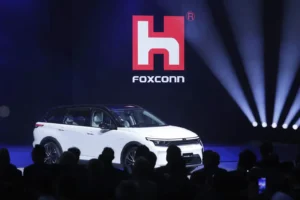Taiwan iPhone Manufacturer Foxconn Aims for the Increasingly Congested EV Market
Newcomers to the auto industry, such as China’s Huawei Technologies and Taiwan-based Foxconn, are strategizing to gain an edge in the electric vehicle (EV) market. In response to this competition, automakers like Japan’s Nissan and Honda have announced plans to join forces against a surge of ambitious rivals.
Foxconn, also known as Hon Hai Precision Industry, has been acquiring key components of the automobile supply chain. It is one of several IT companies leveraging its expertise in communications and electronics.
At last week’s Consumer Electronics Show in Las Vegas, Foxconn’s automotive business, Foxtron—a partnership with Taiwanese automaker and importer Yulon Motor Co.—showcased its automotive electronics and the Model B, a sleek EV hatchback.
From Electric Vehicles to iPhones
Foxconn has ambitious plans, stating it eventually aims to produce four out of five EVs sold globally, regardless of whether it intended to acquire Nissan. Over the last decade, Foxconn has invested approximately $1.3 billion in auto-related acquisitions, according to Mergermarket, a mergers and acquisitions research organization.
Significant initiatives include:
- Foxtron: A partnership with Taiwan’s Yulon Motor.
- Semiconductors: A 50% joint venture with Stellantis NV to design and market automotive semiconductors.
- Chassis Manufacturing: A 50% joint venture with Germany’s ZF Friedrichshafen AG, a major auto supplier.
- Technology Collaborations: Investments in Indigo Technologies (developing a road-sensing system at MIT) and a solid-state battery collaboration with Blue Solutions.
- Vehicle Design: A partnership with Italian automotive designer Pininfarina.
Additionally, Foxconn owns a 34% stake in Sharp, a Japanese electronics company that has been gradually venturing into the automobile industry. Foxconn and Sharp jointly unveiled the LDK+ (Living, Dining, Kitchen) concept vehicle—a boxy minivan equipped with a solar power system, storage battery, and large LCD screen.
Other Technology Firms Joining the Automobile Sector
Other tech giants entering the EV market include:
- Huawei Technologies: Partnering with Seres Group on Aito brand EVs and Chery Automobile on Luxeed brand EVs. It also collaborates with JAC Motor on luxury vehicles.
- Xiaomi: The smartphone and appliance maker is expanding its EV operations.
- Alibaba and Baidu: Both companies are heavily investing in EV technologies.
Japanese electronics companies are also embracing EV production:
- Sony: Partnering with Honda to launch the Afeela EV sedan, expected to go on sale this year.
These companies are entering the automotive market due to the increasing reliance on connectivity between vehicles, phones, laptops, and televisions. However, tariffs and other barriers have slowed progress in certain regions.
Nissan: What About It?
In 2010, Nissan introduced the Leaf, the first mass-market EV, making it an attractive target for newcomers like Foxconn due to its strong EV technology, platforms, and sales capabilities.
Japanese and Taiwanese media have reported that Hon Hai’s chief strategy officer, former Nissan CEO Jun Seki, traveled to France for discussions with Renault SA, which owns a 15% stake in Nissan.
Nissan CEO Makoto Uchida, announcing plans to pursue a merger with Honda, stated that Foxconn had not directly approached Nissan regarding a potential partnership. Foxconn declined to comment.
Despite Nissan’s internal challenges, traditional automakers face greater threats from Tesla, which produces more than half of its EVs in China, and Chinese companies like BYD. Intense competition has already driven over a dozen Chinese EV manufacturers into bankruptcy.
EV Market Challenges
Foxconn must overcome significant hurdles before competing with industry leaders like BYD and Tesla. Slowing EV sales growth and consumer doubts about the affordability and convenience of switching to EVs are key obstacles.
- In 2023, Foxconn acquired a former General Motors facility in Lordstown, Ohio, intending to manufacture the Endurance EV truck. However, Lordstown Motors declared bankruptcy.
- In 2021, Foxconn partnered with Fisker Inc. to produce up to 250,000 vehicles. Fisker later filed for Chapter 11 bankruptcy.
Foxconn’s Exciting Initiatives
Despite these setbacks, Foxconn remains determined. The company lists six EV models on its website, including:
- Model T: A bus.
- Model V: A pickup truck.
- Model N: A van.
- Model B: A hatchback.
- Model E: A luxury sedan.
With ambitious goals, Foxconn is committed to capturing a substantial share of the rapidly evolving EV market.

The latest news and breaking news today : bravenewclimate
Source : apnews






.png)





